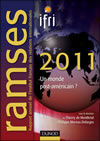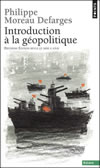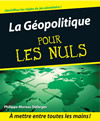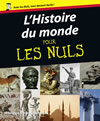Introducing Philippe Moreau Defarges
 Philippe Moreau Defarges (1943) is Editor of the think-tank French Institute of International Relations (IFRI, Paris). Furthermore, he teaches at Sciences Po Paris. Mr Moreau Defarges is a graduate of Sciences Po Paris and has studied at the French Ecole nationale d’administration (ENA). In the past, he worked for the French Foreign Office, mostly on European issues.
Philippe Moreau Defarges (1943) is Editor of the think-tank French Institute of International Relations (IFRI, Paris). Furthermore, he teaches at Sciences Po Paris. Mr Moreau Defarges is a graduate of Sciences Po Paris and has studied at the French Ecole nationale d’administration (ENA). In the past, he worked for the French Foreign Office, mostly on European issues.
He has written many articles and books dealing with international relations, geopolitics, globalization and European unification. The last two new books by Mr Moreau Defarges are: “La géopolitique pour les nuls” (Geopolitics for Dummies) and “L’histoire du monde pour les nuls” (World History for Dummies).
In 2009, the third edition of the highly recommendable “Introduction à la Géopolitique” was published. A year later followed the annual strategic review “Ramses 2011: Un monde post-américain?”, which was co-edited by Mr Moreau Defarges.
Geopolitical Passport
Your relationship with geopolitics
At what age did you discover geopolitics and what attracted you to it?
 Quite late, in my 40s. Being a specialist and a teacher in international relations, I wanted to reach a broad understanding of their theoretical and historical roots.
Quite late, in my 40s. Being a specialist and a teacher in international relations, I wanted to reach a broad understanding of their theoretical and historical roots.
It is always fascinating to explore a technical word and to discover what it could mean. I read a lot on great geopoliticians, their lives and their writings: the American Alfred T. Mahan; the British Halford J. Mackinder, the German Karl Haushofer.
Which geopolitical topics have your focus and why did you choose especially these?
There are actually two issues:
- History. In social sciences, no true understanding of any question is possible without a methodical historical investigation: to look for the beginnings, to identify the twists and turns of an issue.
- Globalization. Does a globalized world erase old geopolitics defined by balance (and imbalances) of power?
What do you consider your most important contribution to geopolitics?
 Popularization. My writings do not pretend and do not want to be seminal works foundingnew theories, they just want to provide tools or keys to understand history and the news.
Popularization. My writings do not pretend and do not want to be seminal works foundingnew theories, they just want to provide tools or keys to understand history and the news.
My geopolitical preferences
What is your favourite definition of geopolitics?
Geopolitics analyses interactions between territories, history and politics.
First, it deals with the impact of environments (e.g. landscapes, climate, resources) on political conducts.
 Second, it assesses the consequences of human thoughts and actions on environments. Geopolitics is not and must not be determinist. It is a ‘human science’ and that makes it a discipline, not a science.
Second, it assesses the consequences of human thoughts and actions on environments. Geopolitics is not and must not be determinist. It is a ‘human science’ and that makes it a discipline, not a science.
Which geopolitical scientist do you admire the most?
Maybe Halford J. Mackinder (1861-1947). He was British and, more, versatile: professor, theoretician, member of Parliament, High Commissioner… A true imperial Victorian!
His concepts are simple and still efficient: World Ocean, World Island, Heartland.
What is your favourite geopolitical book?
For me, the best geopoliticians are the classical authors and their masterpieces:
- Herodote: “The Histories”
- Thucydide: “Peloponesian War History”
- Tolstoy: “War and Peace”, this novel can be an excellent initiation to geopolitics
- Margaret Mitchell: “Gone With the Wind”
What is your favourite geopolitical website?
None.
The geopolitical future
In what direction(s) will geopolitical science be heading the coming decades?
- Micro-geopolitics. For classical geopolitics, states are blocks; they are the only meaningful protagonists. To-day any actor –individuals, corporations, private and public organizations- is a geopolitical actor. These multidimensional geopolitical relations provide a huge area for “new” geopolitics: for instance, self-determination dynamics; geopolitical consequences of migrations, women…
- Macro-geopolitics. The present world is institutionalized. Geopolitics cannot stay focused on states and balance of power issues. The multiple webs –from Internet to United Nations- are reshaping geopolitics, making states cogwheels of the international system.
Which geopolitical subject has been too little in the spotlight and needs further research?
Answer (maybe with the tongue in the cheek): women. Will a world in which women are becoming real political actors be geopolitically different?
What will be the largest geopolitical challenge for the world in the 21st century?
The paramount geopolitical challenge is the eco-political issue: how will mankind survive? Can she promote a sustainable development, exploiting resources without creating irreversible damages?
The deepest geopolitical trends strongly favor world governance: a world economic system; industrialization; overpopulation but also the greying of this population; more and more demanding human beings…
Can men and women set up a governance respecting human freedom? Alternatively, global governance could give birth to the most tyrannical Big Brother.

